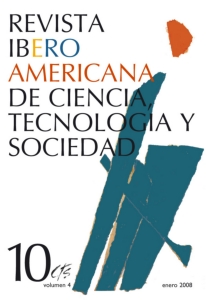Os Usos Sociais do Jornalismo Científico e da Divulgação
O Caso da Controvérsia sobre os Riscos ou a Inocuidade das Antenas de Telefonia Móvel
DOI:
https://doi.org/10.52712/issn.1850-0013-923Palavras-chave:
meios de comunicação, controvérsia científica, telefonia celular, riscos, participação cidadãResumo
O presente artigo propõe uma reflexão sobre a cobertura informativa dos meios de comunicação em temas controversos relacionados com a ciência e a tecnologia, e a forma como essa cobertura se vincula aos processos de participação cidadã. Para isso, recorre-se ao debate em torno da inocuidade ou dos riscos da instalação de antenas de telefonia móvel em uma pequena localidade no sul da Espanha. Conclui-se que um dos problemas identificados na análise do conteúdo dos meios é a falta de profundidade no tratamento da informação sobre ciência e tecnologia.
Downloads
Referências
BAUER, M. (2002): "Controversial medical and agri-food biotechnology", Public Understanding of Science, 11, pp. 93-111.
BUCCHI, M. (1998): Science and the Media, Londres-Nueva York, Routledge.
BURGESS, A. (2007): "Real and phantom risks at the petrol station: The curious case of mobile phones, fires and body static", Health, Risk & Society, 9 (1), pp. 53-66.
COSTA MORATA, P. (1996): Electromagnetismo (silencioso, ubicuo e inquietante), Madrid, Troya Editorial.
GRICE, J. y G. LAWRENCE (2004): "Encuestas a consumidores sobre Biotecnología ¿Formular preguntas hasta obtener respuestas deseadas, o facultar al público para expresar su opinión", Revista Iberoamericana de Ciencia, Tecnología y Sociedad -CTS, 3 (1), pp. 157-182.
LEAN, M. y C. HANKEY (2004): "Aspartamo and its effects on health", British Medical Journal, 329, pp. 755-6.
LEÓN, B. (2006): "Science news as marginal Topic. European television channels compared", en J. Willems y W. Göpfert (eds.): Science and the Power of TV, Amsterdam, University Press & Da Vinci Institute.
LEWENSTEIN, B. (1994): "Science and the media", en S. Jasanoff (ed.): Handbook of Science and Techonology Studies, Londres, Sage Publications.
LÓPEZ CEREZO, J. A. y M. CÁMARA HURTADO (2007): "Scientific Culture and Social Appropriation of the Science", Social Epistemology, 21(1), pp. 69-81.
LÓPEZ PELÁEZ, A. y J. A. DÍAZ (2007): "Science, Technology and Democracy: Perspectives About the Complex Relation Between the Scientific Community, the Scientific Journalist and Public Opinion", Social Epistemology, 21(1), pp. 55-68.
LUJÁN, J. L. y J. A. LÓPEZ CEREZO (2003): "La dimensión social de la tecnología y el principio de precaución", Política y Sociedad, 40 (3), pp. 53-60.
LUJÁN, J. L. y O. TODT, O. (2007): "Precaution in public: the social perception of the role of science and values in policy making", Public Understanding of Science, 16, pp. 97-109.
MORENO, C. y CAMAÑO, R. (2005): "La comunicación de riesgo del contagio de Legionellosis en la Comunidad Valenciana. Un análisis mediático, en Enfermería Integral 72: 34-40.
RAFFENSPERGER, C. y J. TICKNER (eds.) (1999): Protecting Public Health and the Environment. Implementing the Precautionary Principle, Washington, Island Press.
RIECHMANN, J. y J. TICKNER (eds.) (1999): El principio de precaución, Barcelona, Icaria.
ROYAL INSTITUTION (2002): Science and the Media, Londres.
SCHEUFELE, D. A. (1999): "Framing as a Theory of Media Effects", Journal of communication, 103-122.
ÚBEDA, A. y M. A. TRILLO (1999): "Radiaciones RF de antenas de telefonía móvil y salud pública: El estado actual de la cuestión", Radioprotección, 20 (II), pp. 24-36.
VALLVERDÚ, J. (2002): Marc teóric de les controversies científiques: el cas de la sacarina, tesis doctoral, Universidad Autónoma de Barcelona.
WAKS, L. (1990): "Educación en ciencia, tecnología y sociedad: orígenes, desarrollos internacionales y desafíos intelectuales", en M. Medina y J. Sanmartín (eds.): Ciencia, tecnología y sociedad. Estudios interdisciplinares en la universidad, en la educación y en la gestión pública, Barcelona, Anthropos.
Anexo. Selección de medios que publicaron la noticia del referéndum de Los Villares (Granada)
ABC (18/08/07) Una aldea granadina decidirá en las urnas si desea cobertura para en móvil en: www.abc.es
AFP (24/08/07) Un pueblo español rechaza por referéndum el teléfono móvil en: http://afp.google.com
Diario de León (18/08/07) Un pueblo de Granada decidirá en referéndum si quiere cobertura para el móvil en: www.diariodeleon.es
El País de Cali de Colombia (25/08/07) Casos insólitos del mundo en: www.elpais.com.co
El Periódico (18/08/07) Los vecinos de una aldea granadina decidirán en referéndum si en: www.elperiodico.com
EMA RTV (23/08/07) Los cien habitantes de Los Villares (Granada) deciden por refe-réndum si quieren cobertura de móviles en: http://www.emartv.com
Ideal de Granada (24/08/07) Politonos 37, siesta 38 en: http://www.ideal.es
La Nueva Provincia de Argentina (25/08/07) Un pueblo español rechazó por referén-dum el teléfono móvil en: www.lanuevaprovincia.com.ar
La Razón (26/08/07) Un pueblo partido por el móvil en: http://www.larazon.es
News from Spain (23/08/07) Village in Granada to hold a referendum on mobile telephone coverage en: http://www.euroresidentes.com
Radio Granada Cadena SER (22/08/07) Los Villares decide mañana en referédum si quiere cobertura para el móvil en: http://radiogranada.es
Swiss Info (23/98/08) Un pequeño pueblo vota en referéndum seguir sin cobertura en el móvil en: www.swissinfo.org
Telecinco (23/08/07) Los vecinos de un pueblo de Granada deciden por referéndum si quieren cobertura para el móvil en: www.telecinco.es
Terra (23/08/07) Un pueblo de Granada decide hoy en referéndum si quiere cobertu-ra para el móvil en: http://actualidad.terra.es
Downloads
Publicado
Como Citar
Edição
Seção
Licença
Copyright (c) 2025 CC Attribution 4.0

Este trabalho está licenciado sob uma licença Creative Commons Attribution 4.0 International License.
Todas os números de CTS e seus artigos individuais estão sob uma licença CC-BY.
Desde 2007, a CTS proporciona acesso livre, aberto e gratuito a todos seus conteúdos, incluídos o arquivo completo da edição quadrimestral e os diversos produtos apresentados na plataforma eletrônica. Esta decisão é baseada no entendimento de que fornecer acesso livre aos materiais publicados ajuda a ter uma maior e melhor troca de conhecimentos.
Por sua vez, em se tratando da edição quadrimestral, a revista permite aos repositórios institucionais e temáticos, bem como aos sites pessoais, o autoarquivo dos artigos na versão post-print ou versão editorial, logo após da publicação da versão definitiva de cada número e sob a condição de incorporar ao autoarquivo um link direcionado à fonte original.











